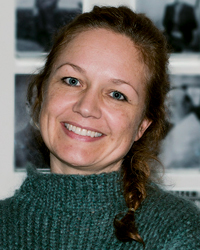This article was translated by UiO:GPT Version 4.
– I love Oslo's sunsets and sunrises, the view from the office, and the collegiality in the department. They are unique, says Adrián del Río.
He arrived in Oslo a few weeks ago and is already in place roughly in the middle of the high-rise building, Eilert Sundt's house, where the Department of Political Science governs over three floors.
The postdoc, originally from Seville, has a bet with his familly about how long it will take before he falls down due to icy streets, but so far, he has not lost the bet.
– The people here at the department are great and welcoming, and the intellectual environment is vibrant. I am grateful of being part of this community, he points out.
Internationally recognized academic community
Political Science at the University of Oslo ranked 29th in the Shanghai ranking last autumn. The placement equaled the best rankings of UiO's academic communities that year.
– If you study authoritarian politics, you should apply to this department because it gathers many internationally recognized researchers on dictatorships, democratic erosion, political elite, and political parties.
For Adrián del Río, these are invaluable resources to draw upon during his project period. He especially mentions the collaboration colleagues at ISV have with international researchers at the V-Dem Institute in Gothenburg, PRIO, and beyond as the ISV’s weekly research seminars reflect.
– No doubts, ISV offers the best opportunities for academic development, to expand the research collaboration with other scholars, and to build networks, the researcher emphasizes.
How loyal is the political elite?
His project is titled "Elite Politics in Electoral Autocracies (ELITE)" and lasts two years.
The main goal is to examine democratization processes in authoritarian regimes and what role the political elite plays in these processes.
del Río emphasizes that today, most dictators exploit democratic institutions like multiparty elections or legislative assemblies to cover up their autocratic rule.
– To carry out this form of governance, a dictator needs a loyal coalition of politicians to control mass unrest, promote policies, and win elections. This loyalty is central to the regime's survival, he explains.
At the same time, he points out that elite divisions within authoritarian regimes can also work for political change.
It can go both ways
According to del Río, it is unclear what type of elite divisions could improve democratization prospects. Defectors may have the resources necessary to strengthen pro-democratic groups.
He cites examples from Mexico, the Philippines, and Kenya, where s elite defectors played a decisive role in the democratic transitions.
However, he also points out that defectors may face suppression or fail to establish anti-regime alliances, which worsens the prospects for democratization.
– I hope to identify which divisions within the ruling elite can weaken autocracies and increase the chances of democratization. For that, we need fine-grained dataset and a research design that combines the strengths of quantitative and qualitative methods, and ELITE will provide these, concludes the postdoc,
His supervisor at the Department of Political Science is Professor Carl Henrik Knutsen.
The EU funds cover two years' salary at the postdoctoral level. In addition, the EU provides generous operating funds to the project on the scale of NOK 240,000. Money that can be used for data collection, analysis, and scientific assistants, for example.
Prestigious
Acting Head of Research and Communication Section at the Faculty of Social Sciences, Marit Eldholm, believes there are many advantages for researchers at the faculty applying to the EU's Marie Sklodowska-Curie program (MSCA-PF).
– MSCA-PF is prestigious funding, because one wins in tough international competition. This provides recognition in academic circles and is a mark of quality on the CV, she says.

– But perhaps even more importantly, the scholarship is a unique opportunity to develop one's own project, expand one's professional networks and hone skills in areas one decides and perceives as important for one's own career.
She points out, for example, specific methodological knowledge and analytical tools, but also generic skills like communication and project management.
MSCA-PF is a mobility scheme that requires that one has not lived in the country for more than one year in the last three years. Thus, one often gets a new country and language in the bargain.
Research support along the way
For the faculty's senior researchers, the MSCA-PF scheme provides an opportunity to recruit strong and promising candidates to their own field and expand networks.
– At the faculty, we work actively with the research support at the units to inform about the opportunities in such EU projects, and we support both supervisors and potential candidates every year in the form of training and individual follow-up, Eldholm informs.
Soon we will start mobilizing for this year's deadline in September and hope more people will become aware of this opportunity to recruit strong candidates to their academic environments, she encourages.
